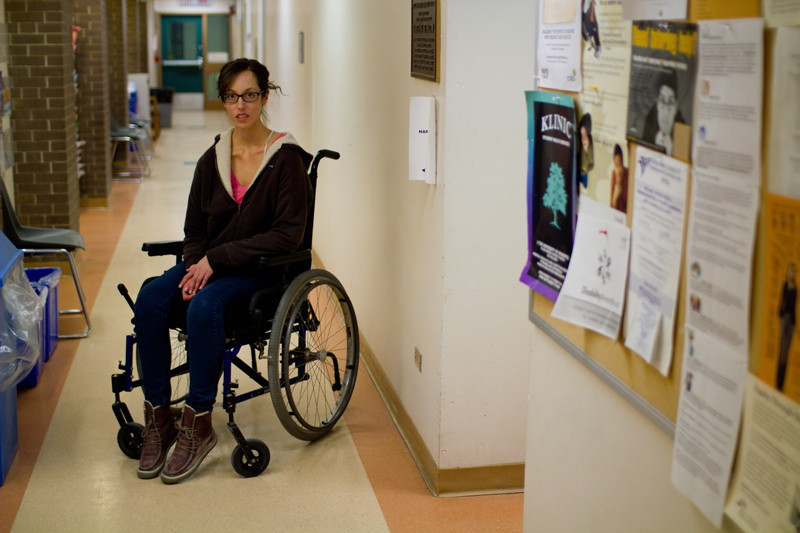Breaking down barriers
People with disabilities are embracing sexuality, sex toys
People with disabilities are fighting back against a society dominated by sexual stereotypes. In growing numbers, they are not only embracing their sexuality, but are broadening the very definition of sex itself.
“People with disabilities are often seen as being asexual, we are seen as having damaged bodies or damaged minds,” said Jesse Turner, the intake and assessment coordinator for the Disability Resource Centre (DRC) at the University of Winnipeg.
Turner uses a wheelchair and often feels self-conscious about her disability. During her recent two-year relationship, she was surprised that someone else could find her desirable and sexual.
“It was shocking, to a certain extent, but in a good way,” she said.
“I’ve always struggled with the thought of other people accepting me as a person with a disability.”
Amanda Hoffman, a project coordinator at the Institute for Policy Research at Northwestern University, believes that society needs to move beyond a definition of sex that is centred around penetration and coitus.
“When you seek the pleasure that is good for you, regardless if it fits into a normative definition of sex, you are finding something that is empowering,” she said.
Sex can be anything that turns you on, she said, whether it comes from touching an earlobe or simply cuddling with a partner.
Hoffman directed a film in the spring of 2009 titled (Sex)abled: Disability Uncensored, while pursuing her master’s degree in sexuality studies at San Francisco State University.
The film exhibited open discussions among people with disabilities at the University of California, Berkeley.
The participants in the film said that sex can explode the notion of disability being synonymous with sexual deficiency.
Michelle Owen, a professor of sociology and the disability studies advisory committee chair at the University of Winnipeg, agreed with the message of the film.
“ When you seek the pleasure that is good for you, regardless if it fits into a normative definition of sex, you are finding something that is empowering.
Amanda Hoffman, sexuality researcher
“I think people with disabilities should be entitled to the sexual experiences that they want,” she said, adding that people can access a number of creative resources and tools, including sex toys, to overcome many of the sexual challenges associated with their disability.
“Anybody can or should use sex toys,” she said.
Sex toys and sexual accessibility
Discreet Boutique, an Ellice Avenue sex shop, is a well-established retail destination in downtown Winnipeg. Their open and nonjudgmental philosophy has been instrumental in helping, and catering to, people with disabilities.
“A lot of times we’ll recommend things that are more ergonomically correct,” said Adrienne Dudek, assistant manager at Discreet Boutique and a long-time activist on behalf of people with disabilities.
Dudek explained that among the most helpful sex toys is a cockring, which can be used by paraplegic men in conjunction with prescription medication like Cialis.
Because the ring sits at the base of the penis and maintains blood flow, it can help significantly with erectile dysfunction, she said.
The Rainbow Resource Centre (RRC), an Osborne Village organization catering to the LGBT* community, provides pamphlets from online sex supply store ComeAsYouAre.com.
The pamphlets promote a wide range of sex toys, some of which are designed for people with disabilities.
For those experiencing regular spasms, the site sells vibrators that simply attach to the finger as well as vibrators that can be strapped around the waist for clitoral stimulation.
Another highly beneficial item is any dildo, particularly Happy Valley dildos, with a suction cup on its base.
“I believe that someone with a disability… (is) in a position to create sexuality or reconstruct sex,” said Reece Malone, education program coordinator at the RRC. “We ... can learn a lot from the disability community.”
Published in Volume 65, Number 17 of The Uniter (January 27, 2011)








